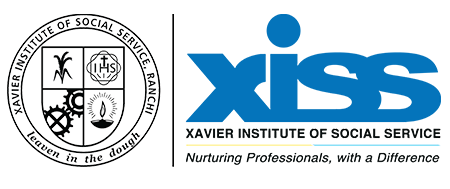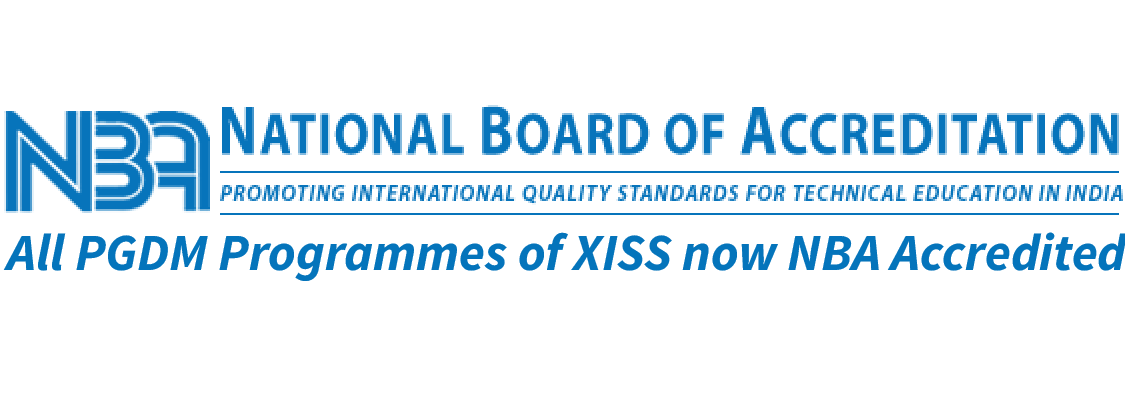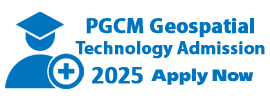Faculty Orientation Program on VISION 2025
An orientation program was organized by Xavier Institute of Social Service (XISS), Ranchi on July 29 2021 to discuss the VISION 2025 of the Institute with its esteemed faculty members and the actions to be taken to bring this vision to life.
The session began with an update on the Society of Jesus by Fr. Xavier Soreng SJ, Superior XISS. He updated the attendees on how this society has been instrumental in the establishment of this institute and many others all over the world. He talked about reinforcing the apolistic values of ‘showing the way of God, walking with the excluded, journeying with the youth, and caring for our common home’ with greater fervor through our institutional activities.
The stage was then taken by Dr. Joseph Marianus Kujur SJ, Director, XISS. He declared the Vision 2025 of the institute ‘To take XISS among the top 30 B-Schools of the country’. His main objective through this vision is to get the Board of Governor’s recognition for XISS by working on various inputs to take the institute forward. He expanded on the principle of R.G.A.E., i.e., Restructuring for Greater Apolistic Effectiveness and said that if we stop becoming effective in our apolistic environment, we have to engage in restructuring, even to the extent of dissolving provincial boundaries.
Dr. Kujur insisted to revisit the concept of universalization and work beyond our boundaries for greater success. In his short term vision for XISS, he focused on internal restructuring through external stakeholders by revising academics and student engagement with the help of super achievers. He laid a special emphasis on live projects, fieldwork, industrial visits, and interstate competitions. On the other hand, the long term goals were concerned with restructuring the course into general management education in the first year and specializations in the second, research and industry exposure for faculty members, and exchange programs for students as well as faculty.
The approach decided upon was to synchronize college led activities (such as reinforcing the image of the institute through intellectual quality, events, academic achievements, alumni achievements etc.) with student led activities ( such as societal work, live projects/consulting assignments, virtual sessions with CEOs or alumni etc.) Dr Kujur also talked about strengthening the academic interface by creating student exchange programs with the top 30 universities of the world and making the institute a center for research, planning and policy interventions.
Furthermore, the orientation program saw active participation with all five programmes presenting on the topic Programme Vision 2025 & its implementation strategy by Dr. Ramakant Agrawal, Head PGDM(Human Resource Management); Dr. Himadri Sinha, Head, PGDM (Rural Management); Dr. Mahua Banerjee, Head, PGDM (IT); Dr. Arup Mukherjee, Head, PGDM (Finance) and Dr. Pinaki Ghosh, Head, PGDM (Marketing) respectively. Fr. Francis David Kullu SJ, Finance Officer, XISS shared XISS Vision 2025 from the Finance aspect of the institute; Dr. Amar E. Tigga shared the institute’s vision on the Central Placement Cell and Dr. Pramil K. Panda shared insights on the Research & Planning cell of
the Institute.
The program was also attended by Dr. Pradeep Kerketta SJ, Assistant Director, XISS along with all esteemed faculty members of the Institute.
DEPARTMENTAL INTERVENTIONS:
1.Department of Financial Management
Dr. Arup Mukherjee, Head of Programme, suggested a holistic approach based on:
- Constantly upgrading and updating the syllabus as per industry requirements.
- Strengthening the commitment towards best delivery of course content.
- Focusing on the development of communication skills.
- Continuous mentoring on a rotational basis.
- Organizing debates and competitions.
- Providing simulation based trading platforms.
- “Putting the last first.”
- Increased exposure to data science.
- Activities beyond office hours.
- Student authored research papers.
- Live Projects.
- Collaborations with JCC, ICAI, ICSI, ICWAI etc.
- Change in SIP structure, faculty involvement with organization.
- Student participation in corporate events.
- Strengthening alumni relations and updating database.
- Organizing experience sharing sessions with alumni.
2.Department of Rural Management
With a departmental vision of taking the PGDM RM programme among the top two
RM programmes in the country, Dr. Himadri Sinha, Head of Programme suggested
the following measures:
- Curriculum update in the academic session 2022-23.
- Enhancing admission demand.
- Pedagogic and academic up gradation.
- Exploration of new areas and introduction of credit transfer facility.
- Live projects.
- Implementation of corporate and NGO projects.
- Industrial sponsored research.
- Industrial talks, expert speak, and guest lectures.
- Mobilizing alumni for SIP and placement support.
- Alumni base enhancement and recognition of RM alumni.
- Increasing branding, visibility, and professional partnerships.
3. Department of Human Resource Management
Through a comprehensive analysis of the current challenges faced by B-Schools, and their response to overcome the adversities, Dr. Ramakant Agarwal, Head of Programme, gave the vision for the HRM programme of XISS.
By applying Kenichi Omahae’s 3C Model to conduct a situational analysis, the following three elements were analysed:
- Customers- The customers for the new age B-Schools are both students and the companies hiring these students. To retain and increase these two partners, technological advancement is the approach that needs to be taken. In addition, simulating learning methods, soft skill based learning, and personalized instruction were suggested.
- Competitors- Weed out other B-Schools as competitors with a stronger business model. Stackable certificate courses and credit transfer options were suggested.
- Company- Strengthening alliances with various partners.
4. Department of Information Technology
Dr Mahua Banerjee, Head of Programme suggested the following measures:
- Blending technology with teaching and learning.
- Use of AI to make learning personalized and customized.
- Industry oriented specialized programs.
- Internships and live projects.
- Development of practical communication and negotiation skills.
- Holistic system thinking.
- Mentoring of SWAYAM courses by faculty.
- Collaborating with MOOC and Ed Tech Platforms
- New curriculum for PGDM IT by 2021.
5. Department of Marketing Management
As laid down by Dr Pinaki Ghosh, Head of Programme, the objectives are:
- Aligning education to the vision of XISS.
- To develop a unique set of individuals working in sales and management.
- Figuring out how and why our domain exists and how do we fill the gaps.
- Holistic education through academic and industry practices.
He further suggested the following measures:
- Academic audits.
- Improving faculty.
- Capturing trends of industry 4.0
- Leveraging alumni for placements.
FINANCIAL INTERVENTIONS:
As established by Fr. David Kullu, Finance Officer, XISS, the Vision 2025 for the finance department is to reach a turnover of 50 to 60 crores.
The following measures were suggested:
- Value creation, not just revenue creation.
- Cohesion and collaboration.
- Transparent policies and procedure.
- Sustainability and ethical practices.
PLACEMENT CELL INTERVENTIONS:
As established by Dr. Amar Tigga, the Chief Placement Coordinator, placements are product of what an institute does.
The vision of the placement cell is to double the average CTC by the year 2025. This is to be achieved by:
- Improving the institute ranking.
- Improving interview performance of students.
- Keeping track of their performance post joining organizations.
The objective of the CPC is to:
- Increasing final offers and paid summer internships.
- Make students industry ready.
- Promoting entrepreneurship and higher education.
RESEARCH & PLANNING CONSIDERATIONS:
As established by Dr. Pramil Panda, Head of Department, the objectives of the department of
Research & Planning are:
- Revenue generation through consulting projects
- Development of a 6 month learning program on Geoinformatics.
- Collaboration with faculty and assistance to faculty & students.
- GIS based training.
- Liaising with alumni for consultancy projects, field projects, and field level trainings.
AUDIENCE INPUTS:
Mr. Anmol Roshan Bodra, Faculty, PGDM Marketing suggested applying for AMBA and
ASGSB accreditation along with NBA and developing a general management course. He
suggested on conducting one year general course and second year specialization course.
Mrs. Mary Sheila Bodra, Faculty, PGDM Human Resource Management stated on not losing our identity as a Jesuit Institute while differentiating ourselves from other colleges.
Dr. Ramakant Agarwal, HoP, PGDM Human Resource Management insisted on placing greater emphasis on professional development of students and creating a solid industry presence.
Dr. Bhabani Prasad Mahapatra, Faculty, PGDM Marketing highlighted on developing XISS as a policy center and undertaking a policy analysis initiative across all departments.
Dr. Himadri Sinha, HoP, PGDM Rural Management advised to have a reasoned discussion on how we are going to exist- the debate on having only one kind of programme or offering a holistic experience and to conduct workshops on how to achieve the Vision 2025.
Mr. Sushil Ranjan Roy, Faculty, PGDM Information Technology discussed to minimize threat from online courses by establishing an era of collaboration, holding hands, and interacting and prepare ourselves for the challenges brought by NEP 2020 such as subject based accreditations.
Dr. Rik Das, Faculty, PGDM Information Technology sought to focus on students as upcoming professionals. He suggested that the courses could be delivered in a new mode/revised mode for better placements.
Dr. Shyamal Gomes, Faculty, PGDM Human Resource Management suggested for a 3- days orientation on the Vision 2025 approach. He also asked to pay attention to the Research and Publications, creating publications thematic for the UGC Care list/ Scopus.
Dr. Prashant K Jha, Faculty, PGDM Finance discussed on the threats from online courses as their fee is too low when compared but the material and assistance they provide is phenomenal.
Dr. Pinaki Ghosh, HoP, PGDM Marketing shared his views on not just having programme based accreditation but subject based accreditation as well.





